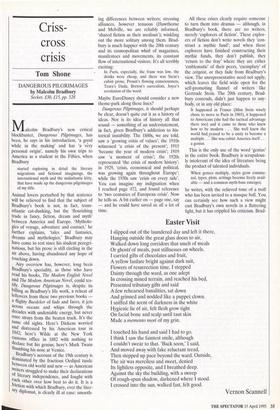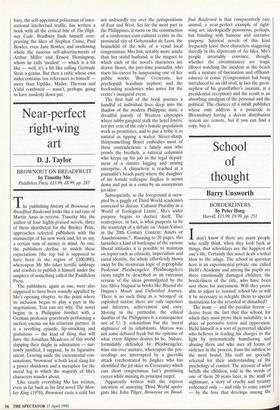Criss-
cross crisis
Tom Shone
DANGEROUS PILGRIMAGES by Malcolm Bradbury Secker, £30, £15, pp. 528 Malcolm Bradbury's new critical blockbuster, Dangerous Pilgrimages, has been, he says in his introduction, 'a good while in the making' and has 'a very personal origin', namely his own trips to America as a student in the Fifties, when Bradbury
started exploring in detail the literary migrations and fictional imaginings, the international myth and the midatlantic kitty, that have made up the dangerous pilgrimages of my title.
Animal lovers perturbed by that sentence Will be relieved to find that the subject of Bradbury's book is not, in fact, trans- atlantic cat-dunking, but the 'flourishing trade in fancy, fiction, dream and myth' between America and Europe. 'Mytholo- gies of voyage, adventure and contact,' he further explains, 'tales and fantasies, dreams and mythologies.' Bradbury may have come to rest since his student peregri- nations, but his prose is still circling in the air above, having abandoned any hope of touching down.
Airy overview has, however, long been Bradbury's speciality, as those who have read his books, The Modem English Novel and The Modem American Novel, could tes- tify. Dangerous Pilgrimages is, despite its billing as Bradbury's life work, a reheat of leftovers from these two previous books _ a flighty Baedeker of fads and faces, it jets across oceans and whips through the decades with undeniable energy, but never once strays from the beaten track. It's the same old sights. Here's Dickens worried and distressed by his American tour in 1842; here's Wilde at the New York customs office in 1882 with nothing to declare but his genius; here's Mark Twain thumbing his nose at Venice. Bradbury's account of the 19th century is dominated by the fractious Oedipal tussle betw. een old world and new — as American writers struggled to make their declarations of literary independence, and fought with a fe.ch. other over how best to do it. It is a riction with which Bradbury, ever the liter- alY diplomat, is clearly ill at ease: smooth- Maybe EuroDisney should consider a new theme-park along these lines?
Dangerous Pilgrimages, it should perhaps be clear, doesn't quite cut it as a history of ideas. Nor is its idea of history all that sound — something of an understatement, in fact, given Bradbury's addiction to his- torical instability. The 1880s, we are told, saw a `growing crisis of values'; the 1910s witnessed `a crisis of the present'; 1915 `became the year of modern crisis'; 1919 saw `a moment of crisis'; the 1920s represented `the crisis of modern history'; in 1929, `crisis, economical and political, was growing again throughout Europe'; while the 1930s saw `crisis on every side'. You can imagine my indignation when I reached page 472, and found reference to 'two centuries of European crisis'. Now he tells us. A bit earlier on — page one, say — and he could have saved us all a lot of time. mg differences between writers; stressing alliances, however tenuous (Hawthorne and Melville, we are reliably informed, 'shared fiction as their medium'); winkling out the more solitary among them. Brad- bury is much happier with the 20th century and its cosmopolitan whirl of magazines, manifestoes and movements, its constant flow of international visitors. It's all terribly
In Paris, especially, the franc was low, the drinks were cheap, and there was Stein's cubist prose, Proust's flowing consciousness, Tzara's Dada, Breton's surrealism, Joyce's revolution of the word.
All these crises clearly require someone to turn them into dramas — although, in Bradbury's book, there are no writers, merely `explorers of fiction'. These explor- ers of fiction don't write novels they `con- struct a mythic fund'; and when these explorers have finished constructing their mythic funds, they don't publish, they `return to the fray' where they are either `emblematic' of their peers, `exemplary' of the zeitgeist, or they fade from Bradbury's view. The unrepresentative need not apply, which leaves the field wide open for the self-promoting flannel of writers ' like Gertrude Stein. The 20th century, Brad- bury contends, didn't just happen to any- body, or in any old place: It happened in France (Miss Stein wisely chose to move to Paris in 1903), it happened to Americans (she had the tactical advantage there too) and it came to those who knew how to be modern • . . She well knew the world had, ceased to be a unity to become a multiple. . . She was cubist America itself. . . a genius.
This is the only use of the word 'genius' in the entire book. Bradbury is scrupulous- ly intolerant of the idea of literature being the product of talented individuals.
When genres multiply, styles grow commu- nal, types, plots, settings become freely avail- able — and a common myth-base emerges,
he writes, with the relieved tone of a troll who has been invited to a masque ball. You can certainly see how such a view might cast Bradbury's own novels in a flattering light, but it has crippled his criticism. Brad- bury, the self-appointed policeman of inter- national intellectual traffic, has written a book with all the critical bite of The High- way Code. Bradbury finds himself over- praising the likes of Stephen Crane, Paul Bowles, even Jane Bowles; and swallowing whole the raucous self-advertisements of Arthur Miller and Ernest Hemingway, whom he calls 'modest' — which is a bit like — well, it's a bit like calling Gertrude Stein a genius. But then a critic whose own index contains ten references to himself — more than Updike, Mailer, Theroux and Vidal combined — wasn't, perhaps, going to have modesty down pat.



























































 Previous page
Previous page